 Petzlover
Petzlover Belgian Shepherd Dog (Tervuren) is originated from Belgium but Formosan Mountain Dog is originated from Taiwan. Belgian Shepherd Dog (Tervuren) may grow 14 cm / 6 inches higher than Formosan Mountain Dog. Belgian Shepherd Dog (Tervuren) may weigh 16 kg / 36 pounds more than Formosan Mountain Dog. Both Belgian Shepherd Dog (Tervuren) and Formosan Mountain Dog has same life span. Belgian Shepherd Dog (Tervuren) may have less litter size than Formosan Mountain Dog. Belgian Shepherd Dog (Tervuren) requires Moderate Maintenance. But Formosan Mountain Dog requires Low Maintenance
Belgian Shepherd Dog (Tervuren) is originated from Belgium but Formosan Mountain Dog is originated from Taiwan. Belgian Shepherd Dog (Tervuren) may grow 14 cm / 6 inches higher than Formosan Mountain Dog. Belgian Shepherd Dog (Tervuren) may weigh 16 kg / 36 pounds more than Formosan Mountain Dog. Both Belgian Shepherd Dog (Tervuren) and Formosan Mountain Dog has same life span. Belgian Shepherd Dog (Tervuren) may have less litter size than Formosan Mountain Dog. Belgian Shepherd Dog (Tervuren) requires Moderate Maintenance. But Formosan Mountain Dog requires Low Maintenance
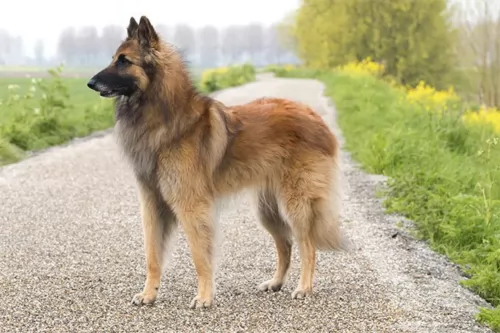 Referred to as the ‘Terv’, this dog from Belguim was created in the late 19th century. He is one of 4 varieties of Belgian Shepherd and he has a long, fawn colored coat. It was in 1892 that the first show for Belgian Shepherds took place and it was the Tervuren variety that won.
Referred to as the ‘Terv’, this dog from Belguim was created in the late 19th century. He is one of 4 varieties of Belgian Shepherd and he has a long, fawn colored coat. It was in 1892 that the first show for Belgian Shepherds took place and it was the Tervuren variety that won.
Breeders of these dogs gave each of the four varieties their own name, and the name Tervuren comes from a Belguim village. This is where M.F. Corbeel bred dogs, believed to be the foundation of the Tervuren breed.
In World War I, many of these dogs were used by the military for war related jobs. Some of these dogs were imported to America for breeding and in 1959 it was considered a separate breed from other Belgian Sheepdogs.
 The Formosan Mountain Dog is most often known as the Taiwan dog and it is a landrace indigenous to Taiwan. It is a small to medium breed of dog that was semi-wild at one time. The colonialization of Taiwan and other foreigners help to fully domesticate the Formosan Mountain Dog. They were found to be very trainable and uniquely suited for the terrain around Taiwan. The dogs were easy to train and now serve as hunting dogs, stunt dogs, guard dogs, rescue dogs, therapy dog and personal companions. There are three types of Formosans two smaller types and one medium. However, the original pure Formosan Mountain Dog is getting close to extinction again because the government and people have provided no protection or conservation efforts for them. These dogs have been living in Taiwan in the mountains and were called Formosan Mountain Dogs when Taiwan was known as Formosa. They come from a line of Southeast Asian hunting/gun dogs and they are considered ‘rare’ now.
The Formosan Mountain Dog is most often known as the Taiwan dog and it is a landrace indigenous to Taiwan. It is a small to medium breed of dog that was semi-wild at one time. The colonialization of Taiwan and other foreigners help to fully domesticate the Formosan Mountain Dog. They were found to be very trainable and uniquely suited for the terrain around Taiwan. The dogs were easy to train and now serve as hunting dogs, stunt dogs, guard dogs, rescue dogs, therapy dog and personal companions. There are three types of Formosans two smaller types and one medium. However, the original pure Formosan Mountain Dog is getting close to extinction again because the government and people have provided no protection or conservation efforts for them. These dogs have been living in Taiwan in the mountains and were called Formosan Mountain Dogs when Taiwan was known as Formosa. They come from a line of Southeast Asian hunting/gun dogs and they are considered ‘rare’ now.
According to historian Dr. Sung Yung-yi, the breed went through 4 major catastrophes that affected their development. The first of these was the Dutch Establishment in 1624. The Dutch colonized Taiwan and imported both people and dogs. The dog they brought in was called the Flying Dog and was either Greyhound or Pointer. Eventually, the Flying Dog bred with the Formosan Mountain Dog. This along with the slaughter of dogs belonging to the indigenous people by the government, starting the decline of the original Taiwan dog.
In 1895, it was the Japanese acquiring Taiwan following the First Sino-Japanese War. The Japanese bred the Formosan Mountain Dog extensively with the own Japanese dogs. This further diluted the line and authenticity of Taiwan dogs.
This was followed by World War II when German Shepherds traveled with the US Army and they cross-bred with the Formosan. This was the third major dilution of the Formosan Mountain dog line. At the same time, the Japanese government considered the Formosan Mountain Dog a sanitation threat and barbaric. They massacred them in large numbers in the name of sanitation.
The fourth and final dilution took place during the Kuomintang Era beginning in 1945 with the arrival of the Chinese Nationalist Party. They brought with them the culture of eating dogs. During this time the economy of Taiwan took off and business people began to import their own foreign dogs that were high priced purebreds. These dogs bred with the Formosan and other Formosans were just abandoned to die. The ranks of the breed became very thin indeed. Today’s pure Formosan is highly valuable and extremely rare. Because of all the crossbreeding over the centuries, today’s purebred Formosan Mountain Dog is very different from the Taiwan dog of old. Today’s Formosan is loved all over the island and is a companion and watchdog.
Today there is an effort by Taiwanese ecologists to put together a research project that would study and preserve the Formosan in its indigenous form. Dr. Yung-yi led this effort. He located only 46 dogs with a pure pedigree, 21 females and 25 males. They let the Food and Agricultural of the United Nations know and the dogs were labeled close to extinction. Reproducing from the indigenous dogs to purify and increase the breed was the goal. The government was not very supportive.
Today the Royal Air Force is looking at the Formosan Dog to use for military security. They are currently only using German Shepherds and needed another choice. It was decided that the Formosan Mountain Dog had a better sense of smell, dexterity, alertness, and hearing as well as better padding on their paws.
Through these efforts and those of foundation stock breeders and owners, the Formosan Mountain Dog in its indigenous form was brought back. Some call this dog a purebred Formosan while others consider it a new type. Standards were presented to the FCI for registrations as a purebred. This debate continues today
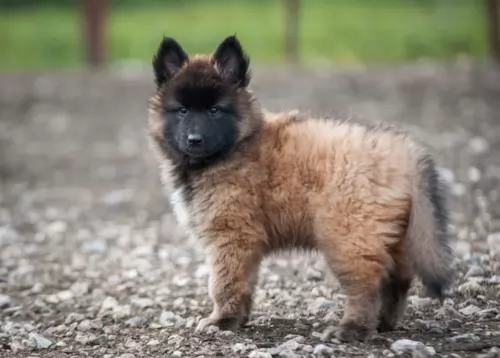 The Tervuren is a medium to large sized, well muscled dog achieving heights of up to 66cm. He has an attractively elegant, regal look to him. The dog has a double coat which is weather resistant. The overall length of the coat which is fawn to mahogany is medium to long and the outer coat is straight with black tips. The males have almost like a mane of hair around the neck that you won’t necessarily find with the females. The tail is long and feathery
The Tervuren is a medium to large sized, well muscled dog achieving heights of up to 66cm. He has an attractively elegant, regal look to him. The dog has a double coat which is weather resistant. The overall length of the coat which is fawn to mahogany is medium to long and the outer coat is straight with black tips. The males have almost like a mane of hair around the neck that you won’t necessarily find with the females. The tail is long and feathery
The Belgian Tervuren is alert and intelligent. His has a long-shaped face with a black mask and upright ears that are sharp and receptive to every sound. He is a herding dog and is full of energy – used to having a job that keeps him busy.
If you don’t want your Tervurens to become destruction, you will need to keep him busy and not just keep him cooped up in the back yard. This particular dog breed is a devoted, loyal pet and forms a strong bond with his human family. However, he will need to be trained and socialized if you want him to behave well around children and pets in the home.
 The Formosan Mountain Dog that was seen during Dr. Sung Yung-yi’s research is a medium-sized dog, athletic and fit. It has a deep chest and a slim waist. The ears are half-covered, the nose is black and there is a coating of black on the tongue. This black tongue is the most distinguishing attribute of the Formosan Mountain Dog. The breed has a strong jaw, the skull that is just slightly longer than the muzzle, which is flat and tapered, triangle face and almond eyes. They have a thick coat and upright, curved tail.
The Formosan Mountain Dog that was seen during Dr. Sung Yung-yi’s research is a medium-sized dog, athletic and fit. It has a deep chest and a slim waist. The ears are half-covered, the nose is black and there is a coating of black on the tongue. This black tongue is the most distinguishing attribute of the Formosan Mountain Dog. The breed has a strong jaw, the skull that is just slightly longer than the muzzle, which is flat and tapered, triangle face and almond eyes. They have a thick coat and upright, curved tail.
The dogs are known to be extremely agile with an ability to hop that is rare in dogs but helps when hunting animals like rats. The Formosan Mountain Dogs hunted in packs with each dog attacking the prey with one bite until it was too exhausted to fight them off any longer.
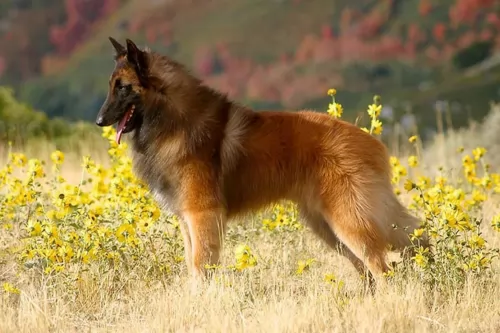 With his beautiful face and lustrous coat, this is a pet that you’re always going to be proud of. Not only that, he is active too, a great watchdog and a fantastic family companion.
With his beautiful face and lustrous coat, this is a pet that you’re always going to be proud of. Not only that, he is active too, a great watchdog and a fantastic family companion.
To keep your Tervuren spritely and contented, ensure he has a high quality diet designed for active herding dogs. He is intelligent too and training and socialization will turn him into an exceptional pet for you. Provide him with lots of human companionship, give him nutritious food and see that any ailments he has are attended to by the vet and you’ll have your attractive pet around with you for up to 12, 13, 14 or 15 years.
 The Formosan Mountain Dog is very child-friendly. He is affectionate and loyal to his family and protective of his children.
The Formosan Mountain Dog is very child-friendly. He is affectionate and loyal to his family and protective of his children.
He is intelligent and has exceptional hunting skills. He is a good guard dog due to his alertness, but they can be fear-aggressive.
He is very adaptable to living in any location as long as there is somewhere for him to get adequate exercise. He is friendly to people and animals.
He is intelligent and learns quickly.
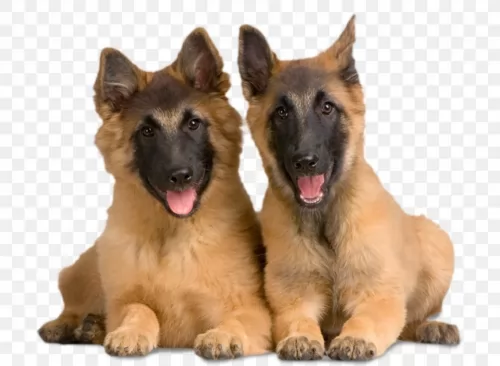 Your Tervuren is a robust, healthy dog breed and with the right food, love and attention, you’re not going to have major health concerns with him. Skin allergies, eye problems and hip dysplasia might be something you want to be aware of.
Your Tervuren is a robust, healthy dog breed and with the right food, love and attention, you’re not going to have major health concerns with him. Skin allergies, eye problems and hip dysplasia might be something you want to be aware of.
A dry, itchy skin with incessant scratching from your pet might require a visit to the vet. If left untreated, an itchy skin and a scratching dog can lead to secondary skin infections and even hair loss. Check for allergies or fleas, and remember that apart from medical management of fleas and ticks, dogs with a dull coat will require a supplement with omega 3 fatty acids.
A common skeletal disorder with malformation of the hip brought on by environmental- and genetic factors. Recognizing the signs of hip dysplasia is important for your dog to help him with pain.
 Because there have not been any studies done on the health of the Formosan Mountain Dog, there is not a lot known about any inherent or genetic health issues. It would seem that some bloodlines are healthy, and others have some serious issues. Especially because there are no studies, it is important for breeders to test for eye issues and skeletal issues through the Orthopedic Foundation for Animals and the Canine Eye Registration Foundation.
Because there have not been any studies done on the health of the Formosan Mountain Dog, there is not a lot known about any inherent or genetic health issues. It would seem that some bloodlines are healthy, and others have some serious issues. Especially because there are no studies, it is important for breeders to test for eye issues and skeletal issues through the Orthopedic Foundation for Animals and the Canine Eye Registration Foundation.
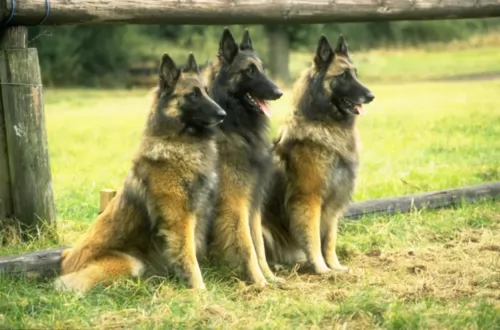 Your Terv is a double-coated dog and he will shed his hair throughout the year. Brushing him at least twice in the week will be necessary to get rid of the hair he sheds. Apart from brushing him and keeping his beautiful coat shiny and healthy, other grooming needs will include clipping his nails and dental hygiene. Brushing his teeth 2 or 3 times a week with specialized dog toothpaste and toothbrush will help with keeping plaque and bacteria at bay.
Your Terv is a double-coated dog and he will shed his hair throughout the year. Brushing him at least twice in the week will be necessary to get rid of the hair he sheds. Apart from brushing him and keeping his beautiful coat shiny and healthy, other grooming needs will include clipping his nails and dental hygiene. Brushing his teeth 2 or 3 times a week with specialized dog toothpaste and toothbrush will help with keeping plaque and bacteria at bay.
Speak to your vet about feeding your Tervuren puppy as he will need at least 4 bowls of food while he is so tiny. By the time he is a year old, he will be able to have 1 or 2 meals a day. Always make sure you feel him high quality food which can be home-made food or commercially manufactured food.
To ensure he doesn’t suffer with any skin allergies, he will need to have some raw meat mixed into his food from time to time. Always provide fresh water for him and make sure to wash the bowls out often.
 Feed a high-quality puppy food for medium size dogs at the rate of a ¼ cup twice a day until 8 months then ½ to ¾ twice a day until 12-16 months.
Feed a high-quality puppy food for medium size dogs at the rate of a ¼ cup twice a day until 8 months then ½ to ¾ twice a day until 12-16 months.
1 to 2 cups of high-quality dry food split into 2 meals per day.
Generally healthy breed. Keep clean and watch for mites.
This is an energetic breed and he needs a lot of exercise. He must have at least an hour of exercise daily but the more, the better. He loves swimming and jogging with his people. He’s athletic, smart and agile. He does well with field trials, tracking, agility, and obedience.